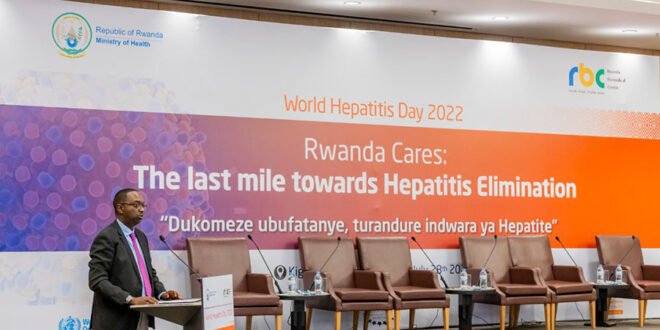Understanding the Prevalence of Hepatitis B in Rwanda
The prevalence of Hepatitis B in Rwanda is currently at 0.25 percent, according to the latest annual report covering the period from July 2023 to June 2024. This means that for every 100 individuals who visit health facilities and undergo testing, approximately 0.25 are confirmed to be positive for the virus. While this figure appears low, it highlights the importance of continued efforts to monitor and address the disease.
Dr. Charles Berabose, the Director of Sexually Transmitted Infections and Other Blood-Borne Infections at the Rwanda Biomedical Center (RBC), emphasized that while the overall rate is relatively low, certain vulnerable groups may experience higher infection rates. These include individuals with weakened immune systems, such as those living with HIV, cancer patients undergoing chemotherapy, and people with chronic conditions like diabetes. Additionally, pregnant women, individuals in collective settings such as prisons, refugee camps, rehabilitation centers, and key populations including sex workers, men who have sex with men, and people who inject drugs are at increased risk.
The Role of Vaccination in Preventing Hepatitis B
Rwanda has integrated the Hepatitis B vaccine into its childhood immunization program since 2002. Newborns born to infected mothers receive their first dose within 24 hours of birth to prevent early transmission. The country also conducts catch-up vaccination campaigns for individuals born before 2002, particularly those at high risk or living with infected individuals. Couples where one partner is infected and the other is not are encouraged to screen and vaccinate to prevent further spread.
Vaccination and testing services are provided free of charge at all health centers and hospitals across the country. Over seven million people have been vaccinated, encompassing both childhood and adult immunizations. Healthcare workers are prioritized for vaccination due to their exposure risk. The government has also launched mass testing campaigns in public spaces such as playgrounds and health facilities to raise awareness and encourage more people to get tested.
Screening and Treatment Efforts
To date, more than five million people have been screened for Hepatitis B, with 9,000 individuals currently receiving treatment. It is important to note that Hepatitis B is incurable, and treatment must be lifelong. The primary goal is to suppress the virus, reduce its load, and prevent complications. However, the virus often goes unnoticed because it is mostly asymptomatic. When symptoms do appear, they can be non-specific, such as fatigue, nausea, vomiting, or yellowing of the eyes, which may be mistaken for other illnesses like malaria.
This lack of clear symptoms makes regular screening essential for early detection. Dr. Berabose pointed out that many people only seek care when the disease has already caused severe liver damage. Patients often arrive with severely swollen abdomens due to fluid buildup, a sign of irreversible liver damage. At this advanced stage, the condition cannot be reversed, and even with treatment, the liver may have developed cirrhosis or progressed to cancer.
Prevention Strategies and Public Awareness
Preventing transmission at birth is a central focus of Rwanda’s efforts to control Hepatitis B. All pregnant women are screened twice—once during antenatal care and again at delivery. This helps detect infections early and ensures exposed newborns receive the birth dose of the vaccine within 24 hours. According to Dr. Berabose, 99 percent of infants exposed to the virus are receiving the birth dose on time, significantly reducing the risk of infection.
The government is also increasing adult vaccination and screening efforts in prisons and detention centers, rehabilitation centers, and other high-risk settings. These initiatives aim to reach as many people as possible, particularly those in vulnerable groups. Dr. Berabose noted that Rwanda is making progress toward the World Health Organization (WHO) goal of eliminating Hepatitis B by 2030. The country continues to screen people aged 15 years and above and focuses on mother-to-child transmission as a priority area.
Encouraging Early Detection and Action
Public awareness campaigns continue to push people to get tested, even if they feel healthy. Some individuals are surprised when they test positive because they feel well. Hepatitis B is often referred to as a silent disease because it does not cause pain. Those on treatment can live normal lives if they take their medication and maintain regular follow-ups. However, without early detection, the virus can lead to serious health problems.
Dr. Berabose urged anyone who has never been tested or vaccinated to visit the nearest health facility. Those who test negative are offered vaccination, emphasizing that early action improves protection. By continuing to prioritize prevention, screening, and treatment, Rwanda is taking significant steps toward controlling and ultimately eliminating Hepatitis B.
 Info Malang Raya Its All About World News
Info Malang Raya Its All About World News




